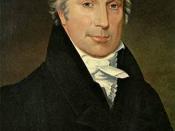For John S. Mill, representation is the best form of government. "The ideally best form of government is that in which the sovereignty, or supreme controlling power in the last resort, is vested in the entire aggregate of the community; every citizen not only having a voice in the exercise of that ultimate sovereignty, but being, at least occasionally, called on to take an actual part in the government, by the personal discharge of some public function, local or general" (Chapter 3). For Mill, representation is essential to good government because is passes the "test" of good government; it has a high level of order and progress. For Mill, representation "promotes the good management of the affairs of society by means of the existing faculties, moral, intellectual, and active, of its various members" [order], and improves "those faculties" [progress] (Chapter 3).
Representation, for Mill, means that the government is a completely popular government - the people vote.
This is necessary in representation because only the individual will consistently stand up for their rights, that an individual is only secure from being disregarded when they get involved and vote for their rights, and that each individual's vote will even out when they are brought into the aggregate will of the voters. This is the ideal of representation for Mill. This means, according to Mill, that each individual is responsible for the protection of his rights and liberties. Because representation is the only form of government that can protect the individual's rights and liberties, it is essential for good government.
This does not mean that Mill is an advocate for direct democracy - he is not. He advocates for a representative government. This is where the people, or some "numerous portion" of them, "exercise through deputies periodically elected by themselves the ultimate...


